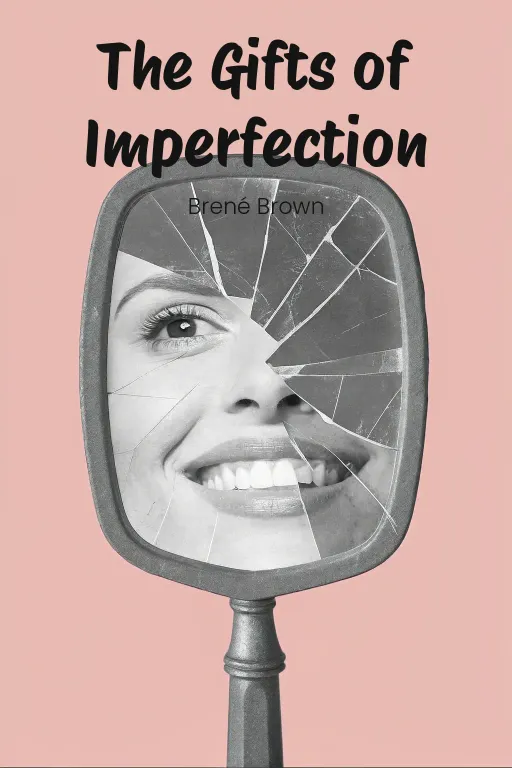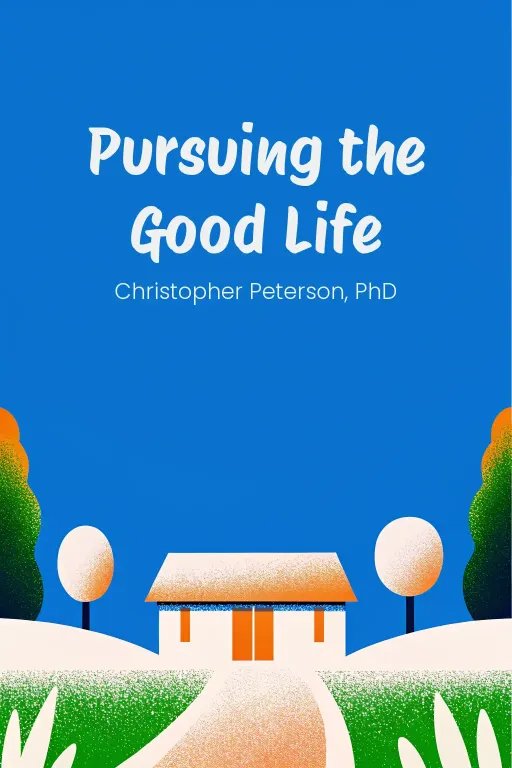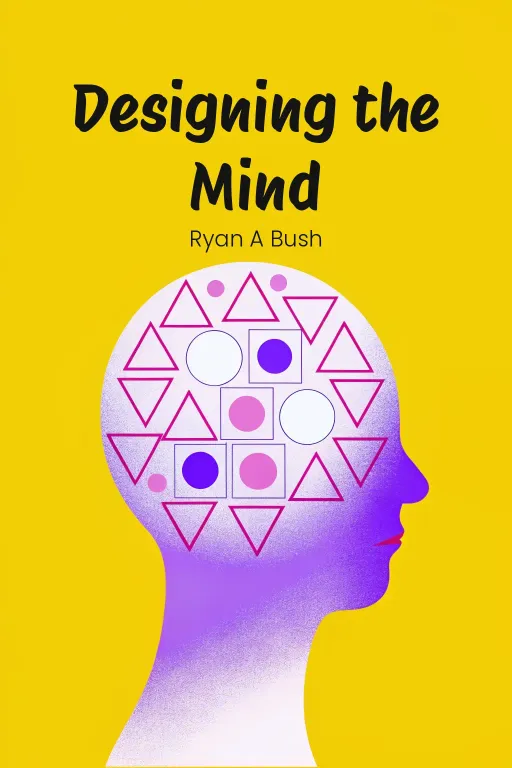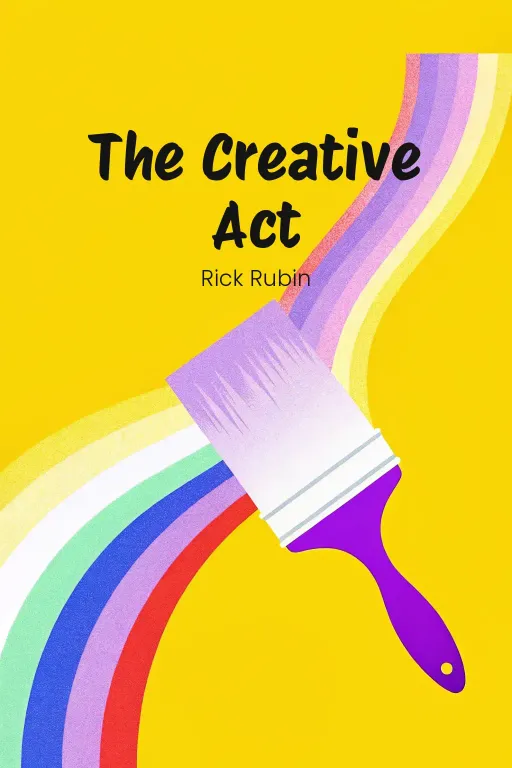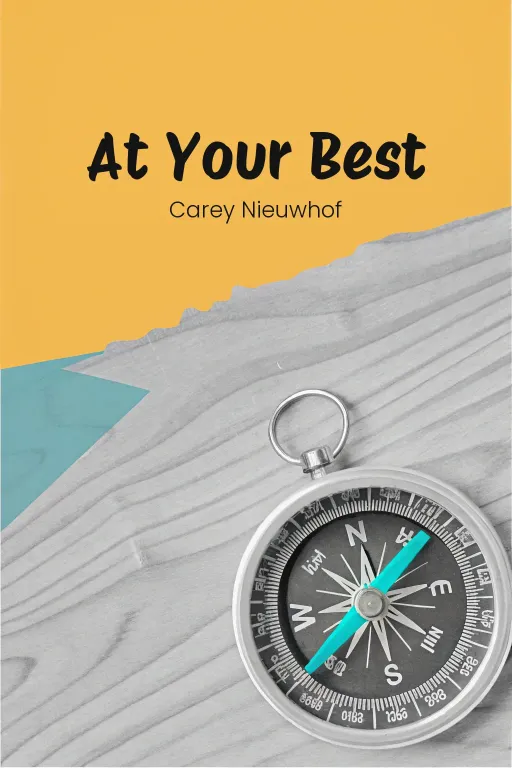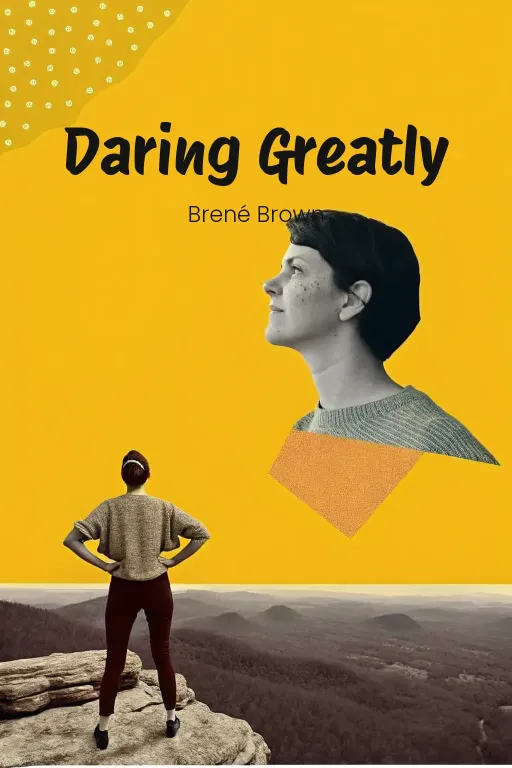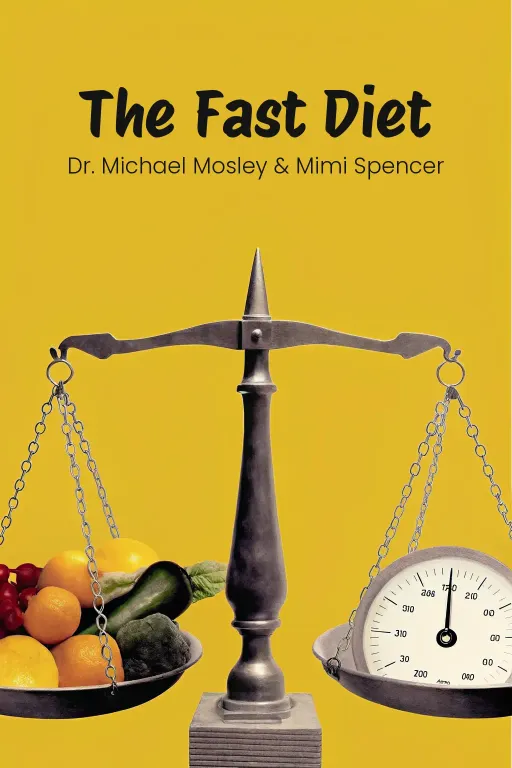
Everyday Wins: Ditch Perfect, Build Real You
Podcast by The Mindful Minute with Autumn and Rachel
Overcome the Pressure to Prove and Show Up for What You Were Made to Do
Everyday Wins: Ditch Perfect, Build Real You
Part 1
Autumn: Okay, let's kick things off with a question I think we can all relate to. Rachel, when was the last time you felt like you absolutely had to have your act together, but inside, you were totally just making it up as you went along? Rachel: Oh, you mean like, every time someone asks me about my 'five-year plan'? I usually just start throwing around buzzwords like "synergy" and "disruptive innovation" while silently calculating how long I can survive on instant noodles. So yeah, pretty sure that counts. Autumn: Exactly! And that constant pressure to be perfect, to have all the answers sorted; it’s draining, isn't it? That’s why I'm excited to talk about Jordan Lee Dooley's Own Your Everyday. For me, it's all about how we can actually break free from those completely unrealistic expectations. Rachel: Right, because what I really need is another book telling me to "find my bliss" while I'm already struggling to find my car keys in the morning. Kidding… mostly. But alright, Autumn, go on – what makes this one different from all the others? Autumn: Well, it’s actually a lot more down-to-earth than that. Dooley’s book has a really nice balance of personal stories and actionable advice, showing you how embracing your imperfections and really shifting your mindset can actually unlock personal growth. It's not about those quick fixes, but it does provide real tools to tackle your insecurities, push past self-doubt, and focus on intentional living. It’s a game changer. Rachel: Okay, I’m listening. So, what’s on the agenda for today’s episode? Autumn: Perfect! Today we're really diving into three key themes from the book. Firstly, the power of vulnerability – why embracing your imperfections actually matters more than trying to fake perfections. Secondly, we’re going to be arming ourselves with practical strategies to really tackle our self-doubt, so that inner critic doesn't just hold us hostage. And thirdly, we’re uncovering the magic of these small daily actions – like Jordan puts it, small steps that build this really purposeful life, just like planting little seeds in a garden every day. Rachel: Vulnerability, self-doubt, and seeds… Sounds like a productive therapy session, if you ask me. But I need specifics here. How do we actually apply this stuff without ending up as one of those overly-enthusiastic motivational influencers? I need real-world applications! Autumn: Don’t worry, Rachel, we're definitely keeping it grounded. Let’s break it all down piece by piece, shall we?
Embracing Authenticity and Vulnerability
Part 2
Autumn: Okay, so let's jump right back in and talk about embracing authenticity and vulnerability. What Jordan “really” nails is this foundational idea of ditching the pressure to be perfect, and instead, finding the guts to show up as your “real”, beautifully imperfect self. Rachel: Right, but let's get specific here. When we throw around the word "authenticity," are we just talking about, like, broadcasting all our dirty laundry? Or is there something more to it that makes it, well, actually useful? Autumn: That's a great point, Rachel. Authenticity isn’t about oversharing everything. It’s more about accepting your imperfections as just part of who you are and allowing them to make you stronger, rather than feeling like you have to hide behind some kind of perfect image. Jordan “really” gets this across when she talks about confronting those myths about perfection that society throws at us. Rachel: Oh, here we go, "societal myths". Is this the part where we blame Instagram filters for all our problems? Autumn: Not exactly. Think about her story about joining a sorority. She remembers this moment, standing there surrounded by all these seemingly perfect, confident women, and just feeling like she didn’t belong. She'd just lost her Nana, who was a huge figure in her life, and in her grief, she started questioning everything. Instead of just being herself, she started trying to become what she thought everyone else wanted her to be. Rachel: Yeah, I know that feeling. It’s like you're trying to play a role that you think everyone else cast you in, and you just end up feeling even more out of place. So what made her realize this? Autumn: Well, she realized that constantly needing everyone's approval just wasn't sustainable. It wasn't until she stopped trying so hard to prove herself that she started making “real” connections. The turning point was when she stopped focusing on trying to earn a seat at the table and realized she could be the table herself—a welcoming space, a place where others could connect and feel valued just as they are. Rachel: "Be the table"? Okay, I like that. But let’s be “real”, letting go of the need to ‘fit in’ sounds great and all, but how do you actually do that when everyone is pushing you to conform? Autumn: That's where vulnerability comes in. It’s such a powerful tool for connection. Jordan talks about a conversation she had with her friend Mel, where they “really” opened up about their struggles. It wasn't just small talk, it was “real”, raw insecurities. By being vulnerable with each other, they created this space where they could both feel seen and understood. Rachel: So, vulnerability isn’t just about word-vomiting your deepest fears for the sake of it, it actually makes relationships stronger, building trust and empathy. Autumn: Exactly! When you drop those emotional barriers, it shows others that they can do the same. There's this memory Jordan has of her Nana using masking tape to build pretend walls in their playhouse. Her Nana was teaching her that the walls were fun for games, but they were obviously barriers you couldn’t walk through. Later in life, Jordan noticed she’d been building metaphorical walls to protect herself from rejection and judgment. But those walls also kept her separated from genuine connections. Rachel: Okay, I’ll admit, that metaphor resonates with me. Those "walls" could be those perfect versions of ourselves we put on social media, the image we want people to believe. But if those walls only keep people out, then… what’s the point? Autumn: Exactly. Taking down those walls is what vulnerability is all about. And Jordan’s point is that imperfection isn’t a weakness — it’s a bridge. It allows for moments of empathy and empowerment, not only for you, but for the people you connect with. Rachel: Alright, let's say I'm buying into this showing-up-with-imperfections thing. What's something I can actually do? How do you stop yourself from falling back into the "try to impress everyone" trap? Autumn: Jordan gives us some practical tools here — starting with how you see insecurity. Instead of running from your flaws, you face them and realize they're opportunities for connection. Sharing your struggles in a safe space — talking to a friend or even journaling — can take away some of the power they have over you. Rachel: Journaling? So you mean my old notes app vents could actually be therapeutic? Autumn: If they explore your true self, yes! Another thing she suggests is shifting your focus. Instead of asking, "How do I compare to them?" you ask, "How can I connect with them?" You're not trying to measure up anymore — you're focusing on creating relationships that have depth and are grounded in authenticity. Rachel: I like that shift — less about competition, more about collaboration. But how do we keep that mindset alive when, constantly, society is pressuring us all to be perfect? Autumn: Gratitude is important here. By appreciating your personal journey and how far you’ve come, you start to resist the need for outside approval. Jordan suggests focusing on small, intentional steps, like creating spaces that encourage vulnerability and transparency. Those spaces grow communities where people can feel safe to bring their imperfections to the table. Rachel: So, essentially, instead of perfection isolating us, authenticity can unite us. And honestly, who doesn’t want a culture of acceptance instead of judgment? Autumn: That's exactly the goal! Vulnerability isn’t just for personal growth — it contributes to a bigger culture change. It encourages empathy, breaks down those fake norms of perfectionism, and builds communities that are based on “real” connection. Rachel: Alright, Autumn, you’re starting to convince me over here. Vulnerability might not pay the bills, but it sounds like it could make life a lot less lonely.
Overcoming Obstacles to Fulfillment
Part 3
Autumn: Definitely. And this shift from seeking validation outside to accepting yourself from within? Crucial. It helps us break down those psychological walls—like impostor syndrome, constantly comparing ourselves, and striving for impossible perfection—that “really” block us from feeling fulfilled. Rachel: Absolutely, because if there’s one thing nobody needs, it’s that inner critic screaming, "You’re a fraud!" So, let’s dive into these barriers. How do we actually deal with them, practically speaking? Autumn: Right, Jordan doesn’t just point out these problems; she gives us actionable tools and frameworks to overcome them. Let’s start with impostor syndrome. Rachel: Ugh, the dreaded "Any minute now, everyone will realize I’m clueless." What’s the solution here, Autumn? Autumn: Well, Jordan’s personal story “really” puts it in perspective. She talks about her early days as an entrepreneur and writer—even with her success, she constantly felt like she didn't deserve it, like it was all just luck. Rachel: And I’m guessing there wasn't some dramatic moment where the skies parted and a booming voice declared, "You are worthy!" Autumn: Nope, it was all internal work. She says self-compassion was the turning point. Instead of thinking, “I don’t belong,” she rephrased it to, “Nobody knows exactly what they’re doing, and that’s perfectly fine.” She realized she wasn’t alone and that her flaws didn’t take away from her value. Rachel: That makes sense. But what does self-compassion look like in practice? Is it just repeating affirmations in the mirror, or is there something more? Autumn: Affirmations can definitely help—Jordan used affirmations like “I am enough” to start changing those negative thought patterns. But it’s also about remembering your strength. She suggests looking back at past challenges you’ve overcome, as proof that you’re capable. Rachel: So, the idea is to remind yourself, "Hey, I’ve gotten through worse things, I can handle this"? Autumn: Exactly. And she also underscores the importance of internal validation—learning to trust your own skills and instincts instead of relying on others to tell you you're good enough. Rachel: Okay, but what if your environment keeps reinforcing those feelings of inadequacy? Say, you’re in a workplace where everyone is constantly trying to one-up each other? Autumn: That’s where community and connection become essential, Rachel. Jordan believes strongly in having a support system of people who recognize and affirm your worth. When you’re surrounded by empathetic people, it's easier to stay grounded in your own value. Rachel: So, you combat that inner critic by building a strong support network? I like that. Moving on from self-doubt, let’s tackle comparison. Isn’t that a major joy-stealer, particularly with social media these days? Autumn: Absolutely. Jordan calls comparison "the thief of joy," and she digs deep into how it can make you feel inadequate. One of her most memorable examples comes from when she was rushing for a sorority. Rachel: Oh, is that the story about standing in line with all these seemingly perfect women? Autumn: Exactly. She explains feeling overwhelmed by self-doubt seeing other women who seemed so polished and confident. Since she was already feeling vulnerable because of a personal loss, it was a rough moment of wondering, “Do I measure up?” Rachel: And I’m guessing that trying to compare herself only made things worse, huh? Autumn: Exactly. It wasn’t until Jordan stopped comparing herself to others and began building authentic connections that she found true belonging. Her key takeaway was realizing that she could find value in her unique self and her own story, instead of trying to be someone else. Rachel: So, realistically, how do we escape this comparison trap? Asking for a friend, of course. Autumn: Jordan suggests a few strategies. Gratitude is her first tool—when you concentrate on what you have rather than on what you lack, you shift your perspective. There’s less room for envy when you’re genuinely thankful for what you have. Rachel: Gratitude keeps popping up, doesn’t it? Starting to feel like the Swiss Army knife of personal development. Autumn: Because it works! Another approach is to celebrate others’ achievements instead of resenting them. When you switch from competition to compassion, it builds deeper, healthier relationships. Rachel: Plus, that sounds a lot less exhausting. Constantly trying to outdo everyone is tiring. Autumn: Exactly. Lastly, Jordan talks about defining success for yourself. When you create goals based on your own values, rather than on societal expectations, you step into a life that matches your purpose—not someone else’s highlight reel. Rachel: Alright, I’m sold. But let’s not forget about our third big challenge: perfectionism. What does Jordan have to say about being trapped in the “never good enough” cycle? Autumn: Perfectionism, according to Jordan, is incredibly limiting because it stops people from even trying. Her example is the infamous "puffy pink jacket" incident during her sorority rush. Rachel: Oh, the one where she felt totally out of place because of something as insignificant as an outfit? Autumn: Yep, that’s the one. She obsessed over the jacket, thinking it represented her inability to live up to perfect ideals. But that incident eventually became a turning point — she realized that chasing perfection wasn’t sustainable—or even necessary. Rachel: Okay, so what's her strategy for kicking perfectionism to the curb? Autumn: She emphasizes embracing the idea that imperfection is part of being human. Instead of focusing on flawless results, shift your energy towards growth and the learning process. Rachel: So, it’s about progress, not perfection. Avoiding that trap where you’re so afraid to fail, you don’t even bother to start. Autumn: Exactly. She also suggests setting realistic goals and limiting exposure to triggers, like overly curated social media feeds. By surrounding yourself with messages of authenticity, you can resist the allure of idealized perfection. Rachel: Okay, so imperfection isn’t the enemy. It’s actually a key to getting unstuck and moving forward. Autumn: Exactly! When you look at these three obstacles—impostor syndrome, comparison, and perfectionism—you see that they’re all connected. And the common thread is vulnerability. Rachel: From what I’m hearing, vulnerability isn’t a weakness. It's actually what promotes growth, connection, and a sense of purpose. Autumn: Well said!
Living Purposefully Through Small Actions
Part 4
Autumn: So, after navigating those obstacles, we can start proactively shaping our lives with purpose. That “really” gets to the core of Jordan's idea – living purposefully through small, intentional actions. It’s not about chasing these huge accomplishments or some vague "end goal," right? It’s about the everyday choices, the simple, meaningful things that ultimately create a fulfilling life. Rachel: So, purpose isn't this big, shiny trophy at the end of the rainbow? Shocking. Okay, Autumn, let's get specific. Why does Jordan think these small actions are so important? What's the reasoning behind it? Autumn: Well, Jordan says that life's meaning is often found in the mundane things. It's not about waiting for that perfect job or some massive achievement. It’s about finding significance in the small moments that make up your day. Her Nana's story illustrates this perfectly. Rachel: Yes, the Nana story. We have to dive into that one, it's quite a story. Remind everyone of the details, will you? Autumn: Sure. Jordan’s Nana was this incredible woman who, after her husband passed away, raised four kids in a completely new country. She was incredibly resilient, but Jordan always remembered how her grandmother found joy in the simplest things. Whether it was dancing during tough times or announcing "Ta-da!" after finishing everyday tasks like setting the table, she transformed ordinary moments into little celebrations. Rachel: And honestly, who couldn’t use a good “Ta-da!” moment now and then? But what’s the real takeaway here? I mean, it can’t just be about cute little quirks, right? Autumn: Exactly. Nana's actions showed Jordan that fulfillment isn't about waiting for perfect circumstances. It’s about creating joy and gratitude in the present moment, even when things are hard. Those seemingly insignificant choices – a silly dance or an act of kindness – create this ripple effect of resilience, connection, and purpose. Rachel: Okay, but if I’m having a horrendous day, are you suggesting I waltz around my kitchen yelling “Ta-da”? While that sounds… interesting, where does this go in real life? Autumn: Good point, Rachel. It's less about imitating specific actions and more about embracing Nana's mindset, which was intentionality and gratitude. Jordan expands on this by detailing ways to bring similar small actions into our own lives, like forming habits that reflect our values. Rachel: For example? Autumn: Simple things, like making your bed every morning. Jordan sees this as a small victory that sets a productive, intentional tone for the entire day. It’s not about the bed itself, it’s about showing up for yourself in these small ways that build momentum over time. Rachel: Fair enough, but let’s not underestimate how we can overthink even the simplest of habits. I can hear the arguments already: "How does making my bed actually contribute to my overall purpose?" Autumn: Right, but think about it this way: the bed-making isn’t about the bed. It’s about discipline, consistency, and establishing a foundation for greater intentionality. It tells your mind that you're taking control of your life, one tiny step at a time. It’s a mindset shift. Rachel: So, small wins lead to bigger wins. That makes sense. But what happens when life gets crazy, and those small routines just feel like another chore? How do you keep them meaningful? Autumn: That's when you need to pause and reflect. Jordan suggests regularly asking yourself, "Am I focusing on what's most important?" By reevaluating your priorities, you make sure your actions still align with your core values. Rachel: Okay, so intentionality isn't a set-it-and-forget-it thing. It's something you actively cultivate. What about connection? You mentioned earlier that’s also a key ingredient. Autumn: Yes, connection through service is another important aspect of this. Jordan highlights that small acts of kindness – helping a neighbor, listening to a friend, or reaching out to someone you haven't spoken to in a while – strengthens our sense of purpose. These actions remind us that our lives aren't just about ourselves, but about the impact we have on others. Rachel: Okay, I like that shift – externalizing the focus. But what about how this ties into living in the present? Because a lot of what holds people back, in my opinion, is this urge to wait for the "right moment." Autumn: Exactly! Jordan calls out this whole "waiting for life to start" mentality. People tend to push happiness or purpose off until they get the perfect job or reach some financial goal. But shifting your perspective to embrace the moment you’re in right now? That’s where the real magic happens. Rachel: Right, and her “I am where I’m supposed to be” mantra plays into this perfectly. But how does she actually guide readers to adopt that mindset? I mean, it's a catchy phrase, but how do you actually internalize it when life isn't exactly feeling perfect? Autumn: For Jordan, it starts with gratitude. She suggests taking time each day to recognize and appreciate the present moment. It’s about reframing challenges as opportunities for growth and remembering that purpose doesn’t need perfect conditions to thrive. She also encourages finding meaning in everyday tasks – cooking dinner, having a meaningful conversation – because those small, connected moments create the foundation for a purposeful life. Rachel: And in practical terms, how do you weave these types of moments into a life that’s already overbooked? Autumn: One way Jordan recommends is by journaling. It’s a simple tool for clarifying what's truly important to you. Writing down your thoughts, expressing gratitude, identifying small steps towards bigger goals – it can help you refocus and remind you of your values. Rachel: So, journaling isn’t just for complaining, it’s a map for intentional living. Got it. Tell me about her “big step” approach: how does that tie in? Autumn: It does. Inspired by her Nana’s mantra, Jordan encourages readers to take decisive, manageable actions even when they're unsure of the outcome. The idea is that courage often comes after you act, not before. Rachel: So, instead of waiting for perfect timing or endless motivation, you just… go for it, and figure it out as you go? Autumn: Exactly! Whether it’s starting a passion project, breaking a bad habit, or reconnecting with someone, each intentional step builds confidence and momentum. When those small steps align with your values, they lead to a greater, overarching purpose. Rachel: Okay, Autumn, you’ve given me a lot to think about – I might even try some of these myself. What about redefining success? How does Jordan suggest we break free from society's expectations and define success on our own terms? Autumn: She says to redefine success through authenticity and values. It’s not about titles, wealth, or external achievements. Instead, it’s about aligning your life with what truly matters to you. Success is different for everyone, and she encourages us to embrace that individuality. Rachel: Makes sense. If I’m understanding correctly, small actions, when done with intention, become the building blocks for a life that is both authentic and deeply fulfilling? Autumn: Exactly, Rachel. Jordan’s message tells us that purpose isn’t something we wait for. It’s something we create, one intentional step at a time.
Conclusion
Part 5
Autumn: Alright, so to bring it all together, Jordan Lee Dooley's “Own Your Everyday” really challenges us to rethink how we live with purpose. It's about embracing who you truly are, dealing with self-doubt, and finding value in those small, intentional actions we take every single day. The book gives us a way to escape the trap of chasing perfection and societal expectations. Rachel: And if I can jump in here, it's also about embracing the messy bits, right? The insecurities, those moments of comparison, our imperfections. Vulnerability isn't a weakness; it's actually what connects us to each other and makes us stronger. Autumn: Precisely, Rachel. And this idea that purpose isn't some huge, dazzling achievement, but it's found in the everyday moments? That's a pretty significant change in perspective. Rachel: It really is. So, a question for our listeners: What's one small, intentional thing you can do today that lines up with what you believe in? Doesn't have to be this grand gesture; it just needs to move you in the right direction. Autumn: Perfectly put. Start small, stay true to yourself, and see how those little steps build up to something truly meaningful. Until our next podcast, take care of yourselves—and your “everyday”!


